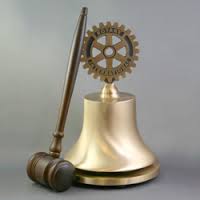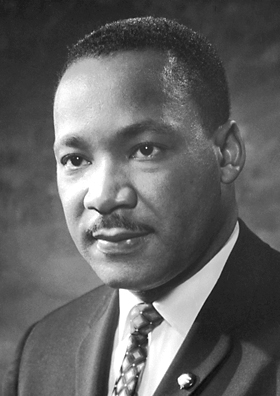E-CLUB PROGRAM
PRESIDING TODAY IS: Diana Martinelli
Welcome all – visitors, fellow Rotarians and guests alike to this E-Club program!
Remember the Four-Way Test!
At the beginning of each meeting we remind ourselves of the The Four-Way Test. Therefore, please remember to ask yourself always . . .
Of the things we think, say or do:
- Is it the TRUTH?
- Is it FAIR to all concerned?
- Will it build GOODWILL and BETTER FRIENDSHIPS?
- Will it be BENEFICIAL to all concerned?
A Reflective Moment
“ ... peace is more precious than diamonds or silver or gold.”
~~ Martin Luther King, Jr.
A Light Moment
If animals made new year's resolutions:
Dog: Love everything more!
Shark: Improve my public image.
Rabbit: Make more rabbits!
Cat: No need: I'm already purrfect.
Our E-Club Meeting:
Dr. Martin Luther King, Jr., Rotary & Peace
As this program is being posted in mid-January, it seems apt to remember our nation's great civil rights leader, Dr. Martin Luther King, Jr., whose birthday is a national holiday. Although many people may be familiar with Dr. King's "I have a dream" speech, few may recall or know that he was awarded the Nobel Peace Prize in December, 1964. As we remember Dr. King and his commitment to nonviolent social change, it's good to know that Rotarians around the world also have a vision and passion for peace. In fact, promoting peace is listed first on Rotary International's list of six focus areas (along with providing clean water, saving mothers and children, supporting education, growing local economies, and fighting disease).
Rotary Peace Centers train up to 100 Rotary Peace Fellows each year through master's degrees or certificate programs to serve around the world. Peace Center education locations include:
- Chulalongkorn University, Thailand (certificate program)
- Duke University and University of North Carolina at Chapel Hill, USA
- International Christian University, Japan
- University of Bradford, England
- University of Queensland, Australia
- Uppsala University, Sweden
You may learn more about Rotary Peace Centers here: https://my.rotary.org/en/take-action/empower-leaders/support-peace-centers
In honor of his birthday, let's revisit Dr. King's life and then watch his eloquent Nobel Peace Prize acceptance speech. At age 35, he was the youngest recipient to have received it. The brief speech offers a rare opportunity to hear about the divisive struggles still ongoing in our nation at that time, and the positive and peace-loving response of this amazing 20th century leader, who still inspires us today.
MLK's Youth (drawn from biography.com)
Martin Luther King, Jr., was born Michael King in Atlanta, Georgia, in 1929. He was the middle child (he had an older sister and younger brother) of a sharecropper who became a pastor, and Martin would follow his father's lead and also become a Baptist preacher. His father took the name of Martin Luther to honor the German Protestant religious leader, and Michael, Jr., ultimately followed suit. Martin Luther King, Sr., believed segregation was an affront to God's will, and he instilled this idea, as well as that of humility, into his children.
As a youth, Martin Luther King, Jr., skipped both the ninth and eleventh grades and began attending Morehouse College in Atlanta at the age of 15. He earned his sociology degree from Morehouse and enrolled in a theological seminary in Chester, Pennsylvania. He went on to become student body president and valedictorian of his 1951 seminary class. While there, the president of Morehouse College remained a role model for King, and King embraced the president's view that religion could be used to help advocate for and achieve social change.
King was accepted into such doctoral programs as Yale and Edinburgh (in Scotland), and chose Boston University. It was in Boston that he met his future wife, Coretta Scott, who was a musician and singer attending the New England Conservatory. They married in 1953 and went on to have four children. King graduated with his doctorate in 1955 at the age of 25.
Inspired by the nonviolent philosophy and work of Mahatma Ghandi, who passed away in 1948, King traveled to India in 1959 to go to Ghandi's birthplace. The trip was said to inspire him to recommit himself to the U.S. civil rights movement and to propound a nonviolent philosophy in doing so. He also continued to work as a pastor, preaching with his father in Atlanta.
In April 1968, Martin Luther King, Jr., gave his final speech in Memphis, Tennessee, in which he said, "I've seen the promised land. I may not get there with you. But I want you to know tonight that we, as a people, will get to the promised land." The next day, while standing on his hotel balcony, he was mortally wounded by a drifter and former convict, James Earl Ray, who was captured two months later. Ray pled guilty to the assassination and died in prison in 1998.
Though taken far too young (King was only 39 when he was killed), King's legacy lives on as a nonviolent champion of social justice and a brilliant, eloquent man with a vision and dream of peace and prosperity for all. At this time of year, as we remember and celebrate his life, listen to his 1964 remarks in Oslo, Norway, as he accepted the Nobel Peace Prize:
Thank you for participating in this week's meeting and for the difference you make in others' lives each day. Please leave a comment to let us know of your meeting "attendance."
If you are a visitor and would like to contribute the normal cost of a meal for your makeup, we would be grateful. These funds go directly to our service projects. You can make a contribution through the Give/Donate link on the homepage. Or you can write a check to: Rotary E-Club of District 7530 and mail it to Treasurer MSRE, 213 Crosswinds Dr., Fairmont, WV 26554.

